Parent’s Guide to Healthier Children’s Sleep
by | Last Updated
A sleepy baby doesn’t mean a happy baby.
On the contrary:
When your kid isn’t getting enough sleep and feels tired all the time, things can become dire for both of you.
That’s why it’s so important to help your child sleep better.
How do you do that, you may ask?
Well, let’s find out.
Healthy Sleep for Babies and Toddlers
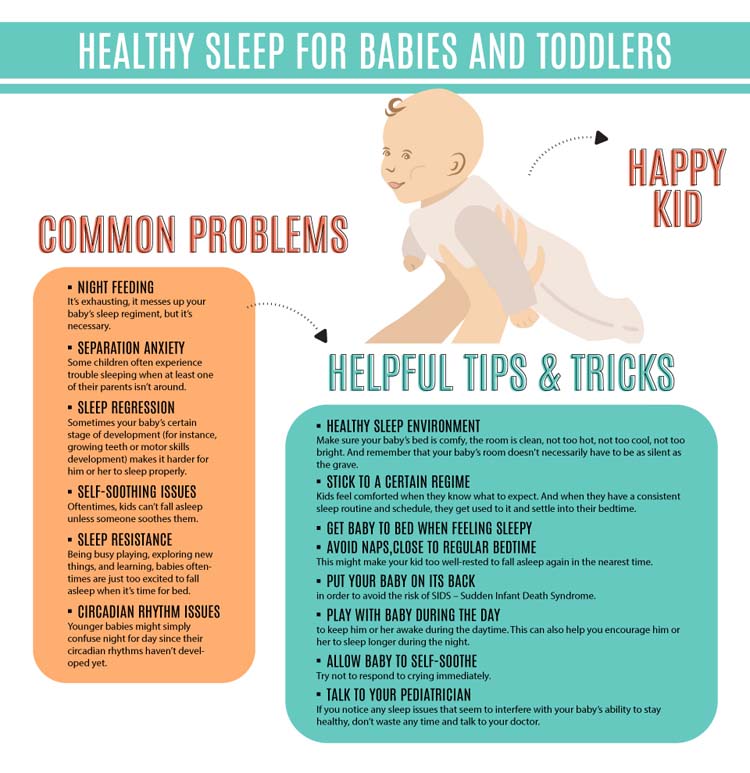 We are aware of the fact that sleep is crucial. It helps young kids restore their energy. Also, establishing a good sleep routine can help your baby wake up more rested, sleep better (and longer without waking up), and just feel better overall.
We are aware of the fact that sleep is crucial. It helps young kids restore their energy. Also, establishing a good sleep routine can help your baby wake up more rested, sleep better (and longer without waking up), and just feel better overall.
What makes it challenging when it comes to a healthier sleep for babies and toddlers is their sleep cycles. You see, small kids sleep differently than adults: they go through a full sleep cycle in around 50 or 60 minutes. This means they are very light sleepers and can wake up easily and at pretty much any time during the night.
Here are some factors that can make it even worse:
- Night feeding. It’s exhausting, it messes up your baby’s sleep regiment, but it’s necessary.
- Separation anxiety. Some children often experience trouble sleeping when at least one of their parents isn’t around.
- Sleep regression. Sometimes your baby’s certain stage of development (for instance, growing teeth or motor skills development) makes it harder for him or her to sleep properly.
- Self-soothing issues. oftentimes, kids can’t fall asleep unless someone soothes them.
- Sleep resistance. Being busy playing, exploring new things, and learning, babies oftentimes are just too excited to fall asleep when it’s time for bed.
- Circadian rhythm issues. Younger babies might simply confuse night for day since their circadian rhythms haven’t developed yet.
Even though you and your baby might have to deal with the sleep issues, there are some things you can do. Here are the most helpful sleep tips and tricks that have a potential to change your and your kid’s lives:
- Create a healthy sleep environment. Make sure your baby’s bed is comfy, the room is clean, not too hot, not too cool, not too bright. And remember that your baby’s room doesn’t necessarily have to be as silent as the grave.
- Stick to a certain regime. Kids feel comforted when they know what to expect. And when they have a consistent sleep routine and schedule, they get used to it and settle into their bedtime.
- Get your baby to bed right away when he or she starts feeling sleepy.
- Try to avoid naps, which are too close to your baby’s regular bedtime. This might make your kid too well-rested to fall asleep again in the nearest time.
- Always put your baby on its back (in order to avoid the risk of SIDS – Sudden Infant Death Syndrome).
- Play with your baby during the day to keep him or her awake during the daytime. This can also help you encourage him or her to sleep longer during the night.
- Allow your baby to learn how to self-soothe. Try not to respond to crying immediately.
- Don’t hesitate to talk to your pediatrician. If you notice any sleep issues that seem to interfere with your baby’s ability to stay healthy, don’t waste any time and talk to your doctor.
“Your baby might also sleep better if he or she has something to comfort them. This can be a pacifier for an infant and a stuffed toy or a blanket for a bit older baby.”
Healthy Sleep for Preschoolers
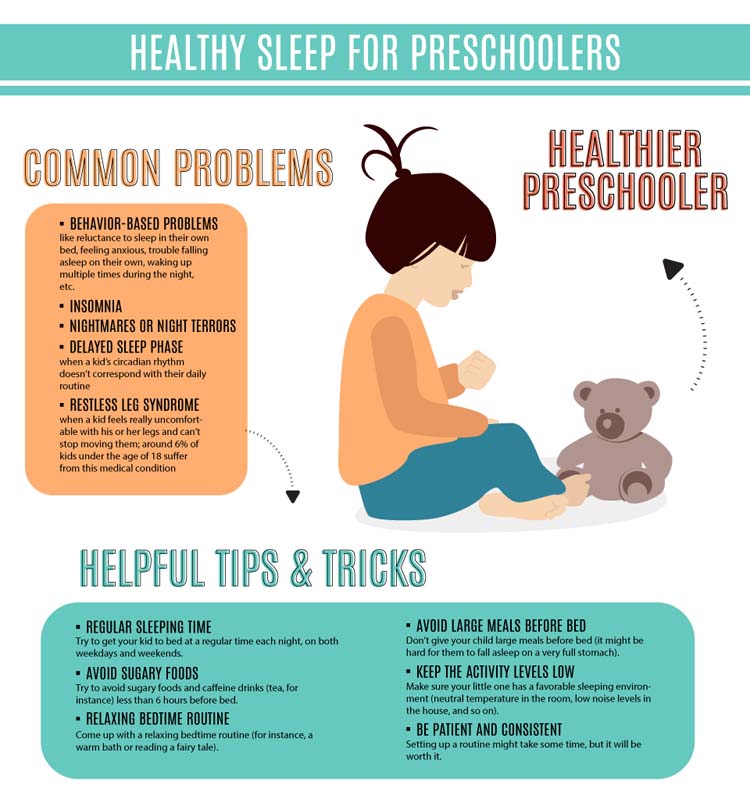 Here’s the deal:
Here’s the deal:
Preschool kids who don’t get enough sleep are likely to experience issues with their emotions, health, and even relationships.
That’s why sleep issues are so dangerous. Now, here are the most common types of sleep disorders younger preschool children may experience:
- behavior-based problems (like reluctance to sleep in their own bed, feeling anxious, trouble falling asleep on their own, waking up multiple times during the night, etc.);
- insomnia;
- nightmares or night terrors;
- delayed sleep phase (when a kid’s circadian rhythm doesn’t correspond with their daily routine);
- restless leg syndrome (when a kid feels really uncomfortable with his or her legs and can’t stop moving them; around 6% of kids under the age of 18 suffer from this medical condition).
Of course, if you are worried about your little one and the quality of their sleep, it is best to talk to a pediatrician. However, there are some things you can do to help your child sleep better before seeing a doctor:
- Try to get your kid to bed at a regular time each night, on both weekdays and weekends.
- Try to avoid sugary foods and caffeine drinks (tea, for instance) less than 6 hours before bed.
- Come up with a relaxing bedtime routine (for instance, a warm bath or reading a fairy tale).
- Don’t give your child large meals before bed (it might be hard for them to fall asleep on a very full stomach).
- Try to keep the activity levels low closer to bedtime so that your kid doesn’t get too excited before bed.
- Make sure your little one has a favorable sleeping environment (neutral temperature in the room, low noise levels in the house, and so on).
- Be patient and consistent — setting up a routine might take some time, but it will be worth it.
These steps are fairly simple but may improve your child’s sleep quality immensely. Also, do not hesitate to ask your pediatrician for some extra tips.
Healthy Sleep for School Kids
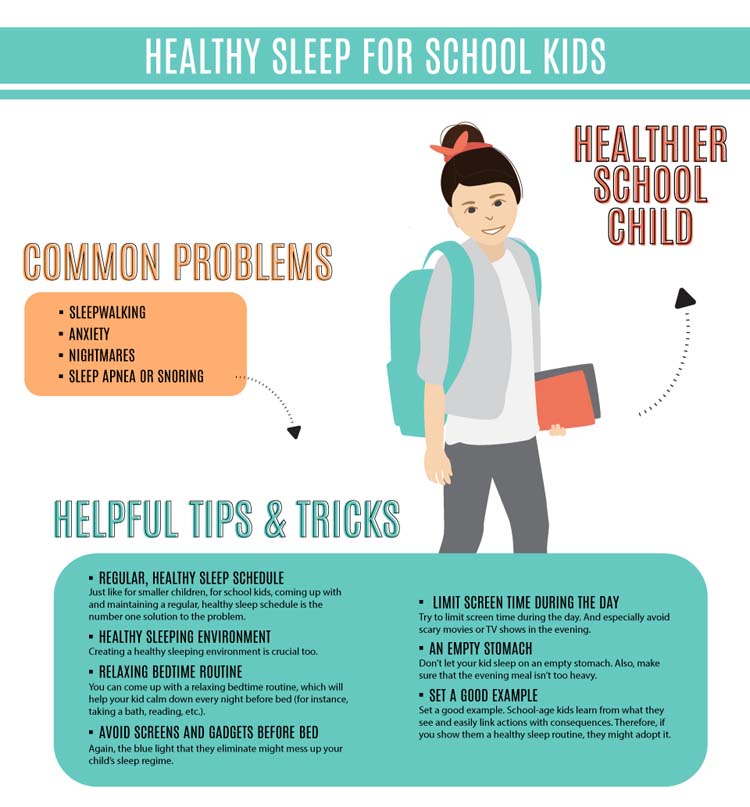 Believe it or not, but more than 60% of school-age kids say that they don’t get enough sleep and, consequently, find it difficult to concentrate during lessons.
Believe it or not, but more than 60% of school-age kids say that they don’t get enough sleep and, consequently, find it difficult to concentrate during lessons.
Some believe that we are to blame the blue light, which modern gadgets and devices eliminate. Others believe that the stress of modern-day life is the number one reason for children’s sleep issues.
Now, here are the most common problems school kids experience:
- sleepwalking;
- anxiety;
- nightmares;
- sleep apnea or snoring.
Whatever the case is, we need to do our best to help our kids. After all, we clearly understand the importance of sleep. So, here are some of the steps you might want to take if your school-age kids have sleep issues:
- Just like for smaller children, for school kids, coming up with and maintaining a regular, healthy sleep schedule is the number one solution to the problem.
- Creating a healthy sleeping environment is crucial too.
- You can come up with a relaxing bedtime routine, which will help your kid calm down every night before bed (for instance, taking a bath, reading, etc.).
- Avoid screens and gadgets before bed. Again, the blue light that they eliminate might mess up your child’s sleep regime.
- Try to limit screen time during the day. And especially avoid scary movies or TV shows in the evening.
- Don’t let your kid sleep on an empty stomach. Also, make sure that the evening meal isn’t too heavy.
- Set a good example. School-age kids learn from what they see and easily link actions with consequences. Therefore, if you show them a healthy sleep routine, they might adopt it.
And remember: if you notice the symptoms of sleep deprivation in your kid (for instance, extreme irritability), do not hesitate to talk to a professional. They might have some helpful tips to share.
Healthy Sleep for Teenagers
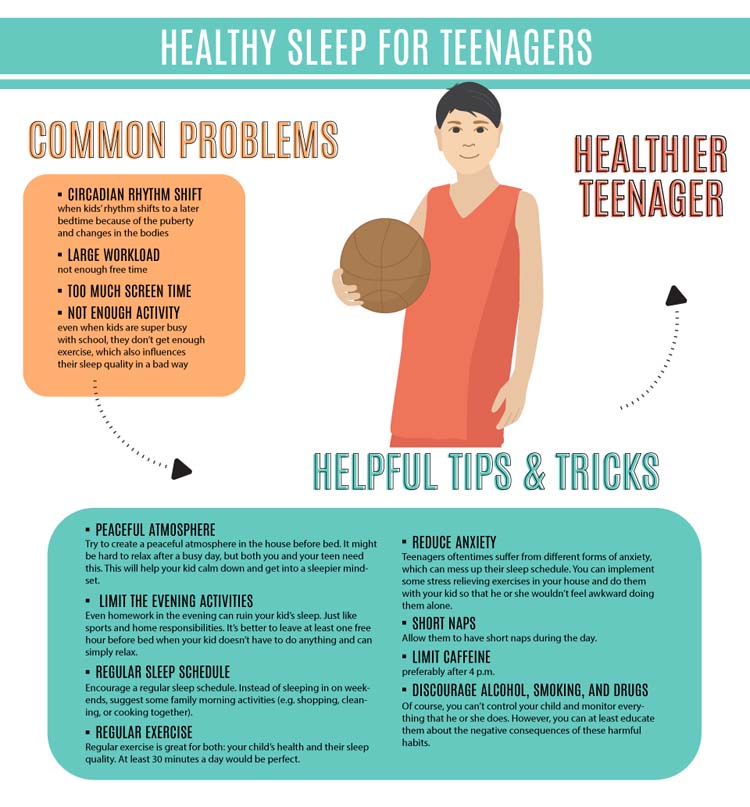 We all know that teenagers have a lot of issues to deal with. And when you add sleep problems to them, some actions need to be taken.
We all know that teenagers have a lot of issues to deal with. And when you add sleep problems to them, some actions need to be taken.
Just think about it:
During the last year, the number of hospital admissions for kids under 16 (with sleep disorders) has grown in almost 30%! Social media, stress, socialization… Anything can influence a young kid and result in lower sleep quality.
Here are the most common sleep issues modern teens face:
- circadian rhythm shift (when kids’ rhythm shifts to a later bedtime because of the puberty and changes in the bodies);
- large workload and not enough free time;
- too much screen time;
- not enough activity (even when kids are super busy with school, they don’t get enough exercise, which also influences their sleep quality in a bad way).
Don’t worry, there are some things you can do to help your teenager sleep better:
- Try to create a peaceful atmosphere in the house before bed. It might be hard to relax after a busy day, but both you and your teen need this. This will help your kid calm down and get into a sleepier mindset.
- Try to limit the evening activities. Even homework in the evening can ruin your kid’s sleep. Just like sports and home responsibilities. It’s better to leave at least one free hour before bed when your kid doesn’t have to do anything and can simply relax.
- Encourage a regular sleep schedule. Instead of sleeping in on weekends, suggest some family morning activities (e.g. shopping, cleaning, or cooking together).
- Regular exercise is great for both: your child’s health and their sleep quality. At least 30 minutes a day would be perfect.
- Try to reduce anxiety. Teenagers oftentimes suffer from different forms of anxiety, which can mess up their sleep schedule. You can implement some stress relieving exercises in your house and do them with your kid so that he or she wouldn’t feel awkward doing them alone.
- Allow them to have short naps during the day.
- Limit caffeine, preferably after 4 p.m.
- Discourage alcohol, smoking, and drugs. Of course, you can’t control your child and monitor everything that he or she does. However, you can at least educate them about the negative consequences of these harmful habits.
“It is helpful to keep the lights low in the evening. This way, the brain gets the signal that the sun is down and it’s time to sleep.”
Creating a Healthy Sleep Environment for Your Child
You can see now that you can do a lot to help your child. And there’s even more. Creating a comfortable, safe, and relaxing sleep environment for your child is another important step you need to take. No matter how old your kid is, a proper sleep environment is beneficial for both their body and mental health.
So, here are some points for your consideration:
- Make sure your baby’s bed is safe and comfy. If your child is still sleeping in a crib, make sure it falls under the safety requirements. For older children, it is important to pick the right mattress (the one that can provide adequate support without being too firm or too plush).
- Pick the right pillow. If your child sleeps mainly on his or her stomach or back, the pillow shouldn’t be thick. For side sleepers, pick something taller, which can fill the space between their head and shoulders and support their neck properly.
- Check every new product that you buy (whether it’s a blanket, a pillow, or even a toy) for potential allergens.
- When picking the sheets, give your preference to natural fabrics. Also, allow your child to pick a design: they will feel much more comfortable sleeping on something that they like.
- Try to keep the bedroom dark. Use thick curtains to block the outside light so that your kid’s brain would understand that it’s time to sleep.
- If your child needs a nightlight to fall asleep, give your preference to something with a mild, soft lighting in order not to mess up your kid’s sleep regiment.
“An alternative to a nightlight is a small flashlight, which you can put next to your kid’s bed. This way, he or she won’t have to fall asleep with the light being on in the room. At the same time, your baby will feel safe knowing that there’s a flashlight he or she can use anytime when feeling scared.”
- Find the right temperature. All kids are different: some might want to feel warmer, others hate sleeping hot. Your job is to figure out the perfect temperature for your little one. You can adjust the thermostat in the room or try different blankets and comforters to see when your kid feels the most comfortable.
- Try to get rid of the clutter. Teach your baby how important it is to keep the room clean and check whether he or she keeps it tidy. The thing is, a bedroom should be associated with sleep, not games (with all the toys lying around) or studying (with dozens of books and notepads stacked on the table near the bed).
- You can use aromatherapy to help your kid relax. However, make sure that you pick a scent that your child is going to like.
Waking Up Is Important Too
Let’s admit it:
We all hate mornings.
Getting out of a warm bed seems like a punishment sometimes. Therefore, it is natural that our kids don’t want to wake up early in the morning and get ready for school. Sometimes, trying to make them do so turns into a real war in your home.
However, there are different approaches to this issue. And who knows, maybe one of them can help you and your child reach an understanding in the morning:
- Start with a sweet greeting. “Good morning sunshine” or “Honey, rise and shine” is much better than yelling “You will be late for school!”. After all, what would you like to hear in the morning yourself?
- Try to avoid the drama. Turning to yelling and losing your temper rarely works. Additionally, screaming at your kids can actually be harmful to them. So, try to stay calm and maybe even turn the process into something fun (for instance, you can start tickling your child and call them cute baby names to make them laugh).
- Cooking a delicious breakfast (or baking something that smells yummy) is a good way to start a day. Maybe the captivating flavors from the kitchen will help your kid leave their bed more easily.
- To make things more fun, you can wake your kid up using his or her favorite song. Or, you can put a radio in their room, play them an audiobook or, as an alternative, a podcast.
- Create a morning ritual, which your kid will not be able to resist. For instance, take your child out for donuts or croissants in the morning before school (once a week, for example). I bet they will get up without a problem on that day.
- If you have a pet, you can use it to wake your baby up. Imagine how sweet it would be: your doggy running into your kid’s bedroom, jumping on the bed, and starting to lick his or her nose!
- Let the light in. Morning light signals the brain that it’s time to wake up. So, open the curtains and let the sunshine slip into your kid’s bedroom to help them get up.
- Teach them what oversleeping means in real life. Learning this lesson when you’re young is quite helpful actually. Make them run to their bus, for example. Or, explain that they will miss out on breakfast. This might seem a bit cruel, but it’s a very effective way to show your kids the reality of sleeping in.
Also read: Best Mattresses For Graco Pack N Play
What to Do When You Have Twins
One baby can be a real challenge sometimes. But what if you have two? When twins are older, you can get them two beds or even give them two separate rooms (if your home allows for it), which means creating a more comfortable sleep environment for each of them.
But what do you do with younger kids and toddlers?
Don’t panic, we’ve got you covered. Consider the following pieces of advice. Each of them is quite effective, so try and test to see which one works best for your babies:
- Because the majority of twins are usually born prematurely, they have smaller stomachs and require more frequent feeding. You can get your partner to help you make those feedings shorter (so that your children could get more sleep). For instance, while you are feeding baby number one, your partner could try to calm the other baby down to create a more relaxing environment for sleep.
- Try to put them to bed at the same time.
- If your babies tend to wake each other up during the night, consider getting separate cribs for them.
- Make sure you put your babies in a safe sleeping position every night.
- Try to come up with a relaxing bedtime routine (for example, bathing or talking with your kids).
- Keep the neutral temperature in the room and make sure your children don’t get too hot during the night.
- Swaddling might be helpful too as it mimics the babies’ state when they were in the womb.
- Make sure their room is dark and quiet (it doesn’t have to be silent, though, since babies are used to the sounds in the womb).
Try to combine multiple tips and methods and see which ones work for your babies and which don’t. Parents around the world have different means of helping their kids sleep better, so don’t be afraid to experiment and try different approaches.
So, have you learned something new? What have you already tried doing to ensure a healthier sleep for your children? How did it work? Let us know in the comments!
Content sharing rights
Feel free to share this article or some specific parts of it. However, please don’t forget to mention it as the original source and link to this website when you share the information. Thanks!



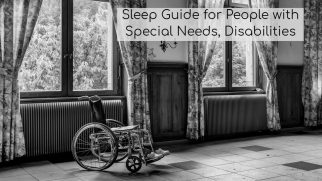

No Comments